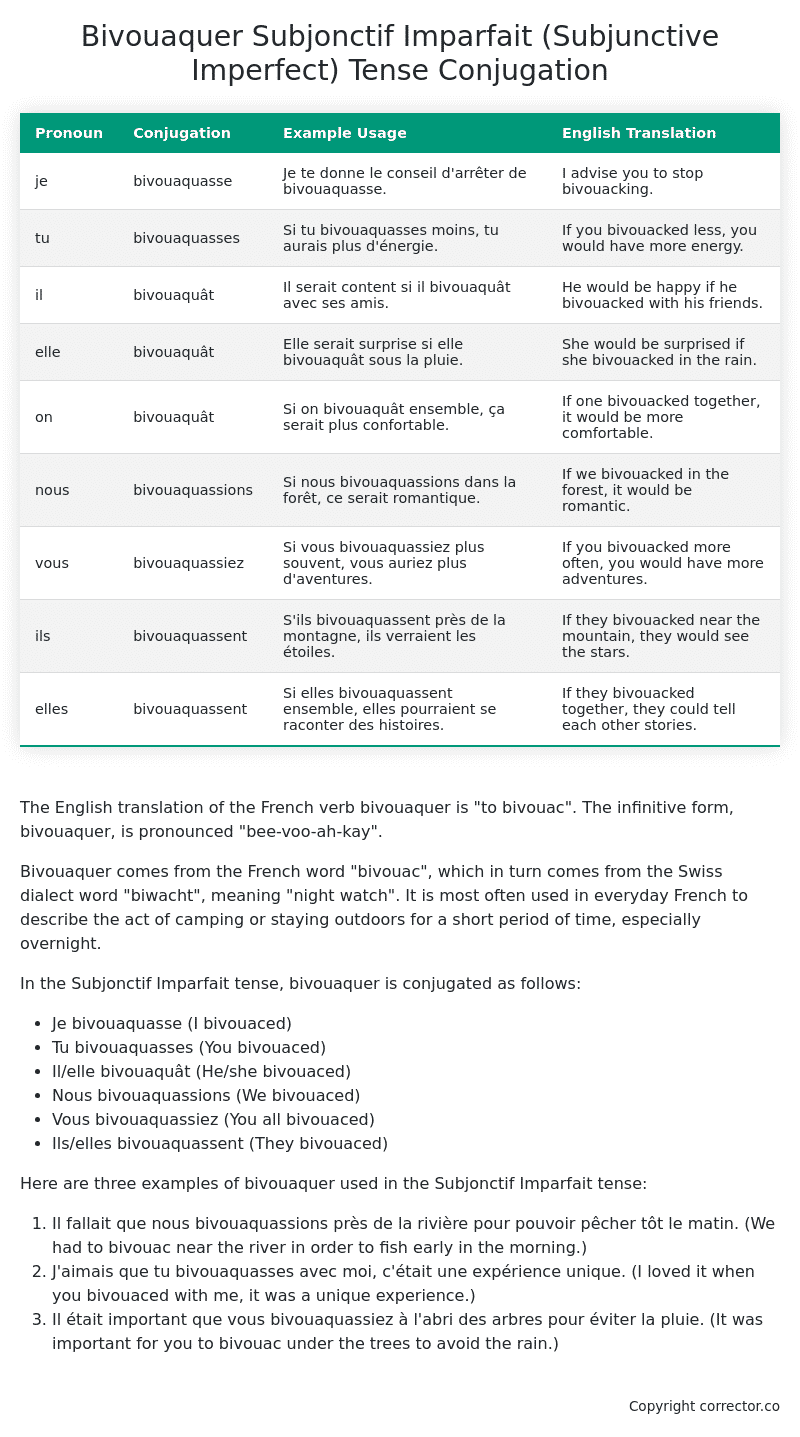Subjonctif Imparfait (Subjunctive Imperfect) Tense Conjugation of the French Verb bivouaquer
Introduction to the verb bivouaquer
The English translation of the French verb bivouaquer is “to bivouac”. The infinitive form, bivouaquer, is pronounced “bee-voo-ah-kay”.
Bivouaquer comes from the French word “bivouac”, which in turn comes from the Swiss dialect word “biwacht”, meaning “night watch”. It is most often used in everyday French to describe the act of camping or staying outdoors for a short period of time, especially overnight.
In the Subjonctif Imparfait tense, bivouaquer is conjugated as follows:
- Je bivouaquasse (I bivouaced)
- Tu bivouaquasses (You bivouaced)
- Il/elle bivouaquât (He/she bivouaced)
- Nous bivouaquassions (We bivouaced)
- Vous bivouaquassiez (You all bivouaced)
- Ils/elles bivouaquassent (They bivouaced)
Here are three examples of bivouaquer used in the Subjonctif Imparfait tense:
- Il fallait que nous bivouaquassions près de la rivière pour pouvoir pêcher tôt le matin. (We had to bivouac near the river in order to fish early in the morning.)
- J’aimais que tu bivouaquasses avec moi, c’était une expérience unique. (I loved it when you bivouaced with me, it was a unique experience.)
- Il était important que vous bivouaquassiez à l’abri des arbres pour éviter la pluie. (It was important for you to bivouac under the trees to avoid the rain.)
Table of the Subjonctif Imparfait (Subjunctive Imperfect) Tense Conjugation of bivouaquer
| Pronoun | Conjugation | Example Usage | English Translation |
|---|---|---|---|
| je | bivouaquasse | Je te donne le conseil d’arrêter de bivouaquasse. | I advise you to stop bivouacking. |
| tu | bivouaquasses | Si tu bivouaquasses moins, tu aurais plus d’énergie. | If you bivouacked less, you would have more energy. |
| il | bivouaquât | Il serait content si il bivouaquât avec ses amis. | He would be happy if he bivouacked with his friends. |
| elle | bivouaquât | Elle serait surprise si elle bivouaquât sous la pluie. | She would be surprised if she bivouacked in the rain. |
| on | bivouaquât | Si on bivouaquât ensemble, ça serait plus confortable. | If one bivouacked together, it would be more comfortable. |
| nous | bivouaquassions | Si nous bivouaquassions dans la forêt, ce serait romantique. | If we bivouacked in the forest, it would be romantic. |
| vous | bivouaquassiez | Si vous bivouaquassiez plus souvent, vous auriez plus d’aventures. | If you bivouacked more often, you would have more adventures. |
| ils | bivouaquassent | S’ils bivouaquassent près de la montagne, ils verraient les étoiles. | If they bivouacked near the mountain, they would see the stars. |
| elles | bivouaquassent | Si elles bivouaquassent ensemble, elles pourraient se raconter des histoires. | If they bivouacked together, they could tell each other stories. |
Other Conjugations for Bivouaquer.
Le Present (Present Tense) Conjugation of the French Verb bivouaquer
Imparfait (Imperfect) Tense Conjugation of the French Verb bivouaquer
Passé Simple (Simple Past) Tense Conjugation of the French Verb bivouaquer
Passé Composé (Present Perfect) Tense Conjugation of the French Verb bivouaquer
Futur Simple (Simple Future) Tense Conjugation of the French Verb bivouaquer
Futur Proche (Near Future) Tense Conjugation of the French Verb bivouaquer
Plus-que-parfait (Pluperfect) Tense Conjugation of the French Verb bivouaquer
Passé Antérieur (Past Anterior) Tense Conjugation of the French Verb bivouaquer
Futur Antérieur (Future Anterior) Tense Conjugation of the French Verb bivouaquer
Subjonctif Présent (Subjunctive Present) Tense Conjugation of the French Verb bivouaquer
Subjonctif Passé (Subjunctive Past) Tense Conjugation of the French Verb bivouaquer
Subjonctif Imparfait (Subjunctive Imperfect) Tense Conjugation of the French Verb bivouaquer (this article)
Subjonctif Plus-que-parfait (Subjunctive Pluperfect) Tense Conjugation of the French Verb bivouaquer
Conditionnel Présent (Conditional Present) Tense Conjugation of the French Verb bivouaquer
Conditionnel Passé (Conditional Past) Tense Conjugation of the French Verb bivouaquer
L’impératif Présent (Imperative Present) Tense Conjugation of the French Verb bivouaquer
L’infinitif Présent (Infinitive Present) Tense Conjugation of the French Verb bivouaquer
Struggling with French verbs or the language in general? Why not use our free French Grammar Checker – no registration required!
Get a FREE Download Study Sheet of this Conjugation 🔥
Simply right click the image below, click “save image” and get your free reference for the bivouaquer Subjonctif Imparfait tense conjugation!

Bivouaquer – About the French Subjonctif Imparfait (Subjunctive Imperfect) Tense
Formation
Common Everyday Usage Patterns
Interactions with Other Tenses
Subjonctif Présent
Indicatif Passé Composé
Conditional
Conditional Perfect
Summary
I hope you enjoyed this article on the verb bivouaquer. Still in a learning mood? Check out another TOTALLY random French verb conjugation!


